


Numbers from #1 to #99
PANAMERICANOS CAR GROUP
TYPE OF CAR
Volvo P544, Ford 1954, Mercury 1954, Chevrolet Bel Air.
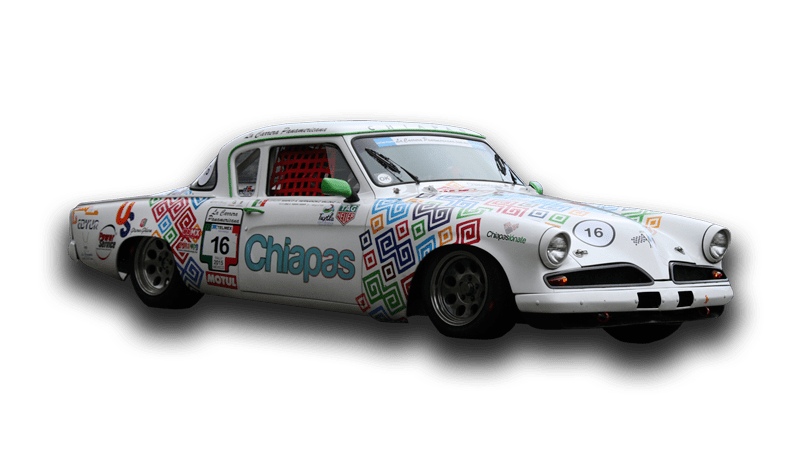
SPECIFICATIONS
All production cars (sedans) from 1940 to 1954 with original bodies and F.H./O.H.V. V8 engines; or F.H./O.H.V. and S.O.H.C. inline 6 engines; and O.H.V./O.H.C. and D.O.H.C. 4-cylinder engines. Engines must be of the same brand or family and configuration as the original.
Engine: En autos cuyos motores sean difíciles de obtener, se autoriza el uso de motores de diferentes fabricantes, pero de la misma configuración y cantidad de cilindros. Es obligatorio el uso de cabezas de fierro en motores de 8 cilindros en V (O.H.V.). No se permite el uso de motores de producción limitada o de fabricación especial para carreras. Para los autos sedanes americanos se permite un desplazamiento máximo de 8 pulgadas (20.32 cm.), con respecto a la posición original del motor. Cilindrada y carburación para autos con motores de:
▪ 4 Cilindros hasta 2500 cc (153 pulgadas cúbicas) y 2 carburadores de 2 gargantas cada uno.
▪ Para Volkswagen, 2 carburadores de 2 gargantas.
▪ 6 Cilindros hasta 5,000 cc (305 pulgadas cúbicas), tres carburadores de dos gargantas o 1 carburador de 4 gargantas de 600 c.f.m. como máximo.
▪ 8 Cilindros hasta 5,000 cc (305 pulgadas cúbicas), un carburador de cuatro gargantas de 600 c.f.m. máximo.
Numbers #100 to #149
PANAMERICANOS CAR GROUP
TYPE OF CAR
Chrysler 1954, Buick Centurion, Studebaker Champion, Studebaker Commander, Oldsmobile Super 88, Ford Victoria; Buick Century.
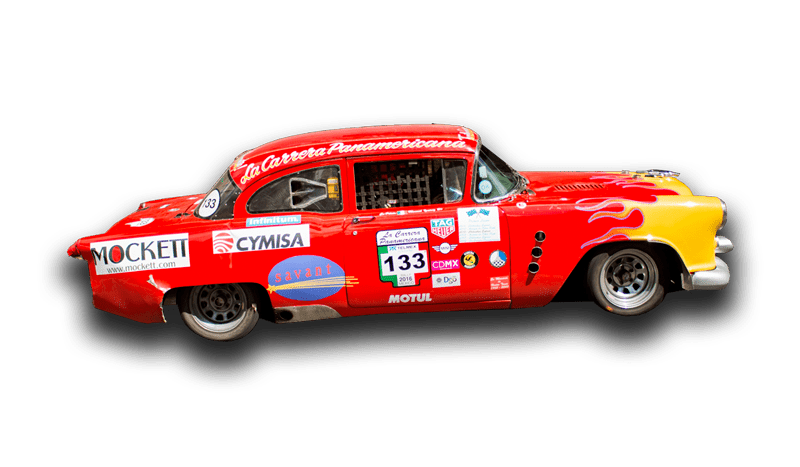
SPECIFICATIONS
All production sedans from 1940 to 1954 with original bodies and D.O.H.C. inline 6-cylinder and O.H.V. V-8 engines, as well as O.H.C. and D.O.H.C. 4-cylinder engines.
Engine: Modern engines of the same brand/family and configuration will be allowed, as long as they have a mechanical distributor for the ignition system, with displacement up to 5,000 cc (305 cubic inches) for 6-cylinder engines and 6,000 cc (366 cubic inches) for V-8 engines, and 2,500 cc (152.6 cubic inches) for 4-cylinder engines. The use of aluminum heads is allowed. For American sedans, a maximum displacement of 8″ (20.32 cm) is allowed, with respect to the original position of the engine. The use of a dry sump is not allowed. The authorized carburetion depends on the number of cylinders in the engine, according to the following:
▪ A 4-barrel carburettor (max. 600 c.f.m.) for V8 engines.
▪ Three 2-barrel carburettors for 6-cylinder in-line engines.
▪ Two 2-barrel carburettors for 4-cylinder engines.
Numbers #150 to #199
PANAMERICANOS CAR GROUP
TYPE OF CAR
Porsche 356, MGA, Triumph TR2, Alfa Romeo Sprint/Spider, Volvo 122S.
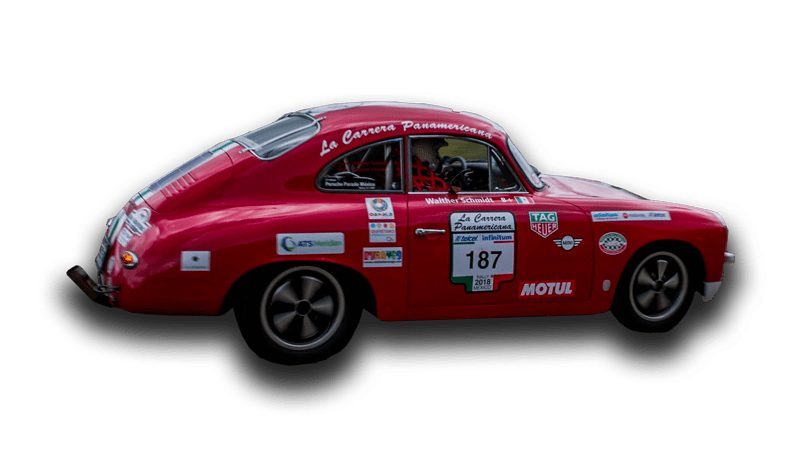
SPECIFICATIONS
Mass-produced and limited-production sports cars, prototypes and/or reproductions authorized by the Organizing Committee from 1940 to 1954 or similar (Article 15) with original bodies and/or those made of the same material and with original or open engines up to 2000cc (122″ cubic capacity) for mass-produced cars.
Engine: For the Minor Sport category and in all cases, the use of modern mass-produced 4-cylinder engines with a configuration similar to the original car (in-line or boxer) is permitted, with a maximum displacement of 1,600 cc, 4 valves per cylinder and double overhead camshaft (D.O.H.C.). Any limited production car or prototype from the period must retain its mechanical characteristics. However, a 15% increase over the original 1954 displacement is permitted. A maximum displacement of up to 6″ with respect to the original engine position is permitted. Intake is unrestricted using a maximum of 2 carburetors with 2 barrels each. Multiple carburetors may be used. Injection systems are not permitted.
Numbers from #200 to #250
PANAMERICANOS CAR GROUP
TYPE OF CAR
Jaguar XK 120, 140, 150i, Chevrolet Corvette.
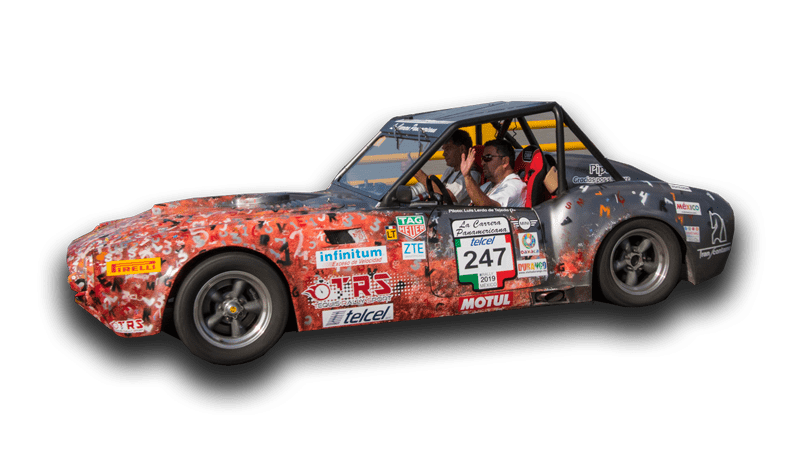
SPECIFICATIONS
All mass-produced and limited-production sports cars, prototypes and/or reproductions authorized by the Organizing Committee from 1940 to 1954 or similar (Article 15) with original bodies and/or of the same material or a contemporary substitute authorized by the organizing committee and with original engines or those of the same family greater than 2,000cc (122″ cubic) and open up to 5,000cc (305″ cubic), unless the original displacement was greater.
Engine: Para la categoría “Sport Mayor” y en todos los casos, los motores deben ser originales, aunque se permite el uso de motores modernos de 6 cilindros en línea de producción masiva con una cilindrada máxima de 3,000cc (183″ cúbicas) cuatro válvulas por cilindro y doble árbol de levas (D.O.H.C.). Cualquier auto de producción limitada y/o prototipo de la época deberá conservar sus características mecánicas. Sin embargo, se autoriza un incremento del 15% arriba del desplazamiento original de 1954. En los autos deportivos (sport), la admisión debe ser con el sistema original. Para todos los autos de esta categoría con motores modernos, se puede utilizar un máximo de tres carburadores de dos gargantas cada uno. En caso de reemplazarse los carburadores originales de cualquier motor tipo V8, se permite el uso de un carburador de cuatro gargantas con un límite máximo de 600 c.f.m. No se permiten sistemas de inyección, a menos que los modelos hayan sido fabricados originalmente con este sistema.
Numbers from #400 to #450
PANAMERICANOS CAR GROUP
TYPE OF CAR
Nash Ambassador, Chevrolet Bel Air, Ford Victoria, Oldsmobile 88, Alfa Romeo YOU.
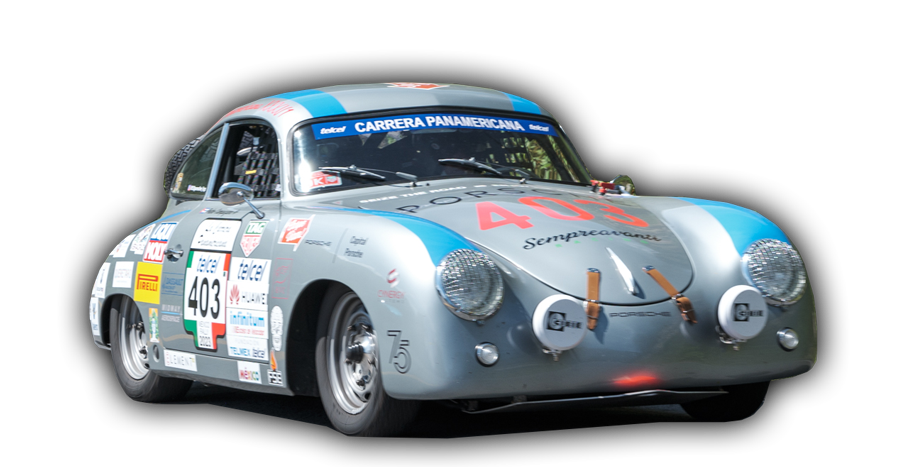
SPECIFICATIONS
Aquí se agrupan los autos de la misma marca, modelo y año de aquellos que participaron en La Carrera Panamericana original de 1950 a 1954. La apariencia del auto deberá ser la original, permitiéndose únicamente las modificaciones y puesta al día de algunos sistemas para mejorar la seguridad sin afectar la apariencia original. Igualmente serán admitidos todos los automóviles que cumplan con el apéndice “K” y posean un “FIA HTP” (Historic Technical Passport) dentro del periodo “E” de 1950 a 1954 o similares serán aceptados por el Comité Organizador mientras cumplan con requisitos actuales en materia de seguridad. Para esta categoría, en caso de que se presenten tres o más autos de una cilindrada específica, el Comité Organizador abrirá una “Clase” propia al rango de cubicaje de los autos.
Engine: Se permite el uso de motores originales o similares en configuración y características sin modificaciones y con carburador de dos gargantas máximo 500 c.f.m. o cuatro gargantas máximo 600 c.f.m. Si el motor original es utilizado, la cilindrada del mismo deberá ser respetada con una tolerancia de 5% sobre la original y conservar el carburador de origen o sustituirlo por uno con las características descritas en el párrafo anterior (dos gargantas 500 c.f.m. o cuatro gargantas 600 c.f.m.). Las cabezas de fundición de hierro no pueden ser reemplazadas por cabezas de aluminio. El árbol de levas, múltiple de admisión, carburador y el distribuidor se pueden reemplazar por componentes de diseño moderno, limitando que el flujo máximo del carburador no exceda 600 c.f.m. Se permite reemplazar a los múltiples originales con “headers” de escape con el diámetro y el largo de los tubos de escape sin restricciones.
Numbers from #251 to #279
HISTORIC CARS GROUP
TYPE OF CAR
Austin Healey Sprite/100, Austin Mini, Alfa Romeo Giulietta TI/Spider, Giulia 1,600, Porsche 356 a/b/c, Porsche 912, Volvo PV 544/1600/1800, VW Karmann Ghia, Triumph TR2/3/2, Sunbeam Rapier/Alpine, Renault Dauphine/Floride 845 cc R-81108,1300 Morgan plus 4.2 l, Citroen ds 19, Hillman Minx, Lotus Elite/Elan 1600, Mercedes Benz 180/190, Fiat 1100/1200/1500, Borgward Isabella/Coupe, Ford Cortina Lotus, Honda S 600, MG 1600.
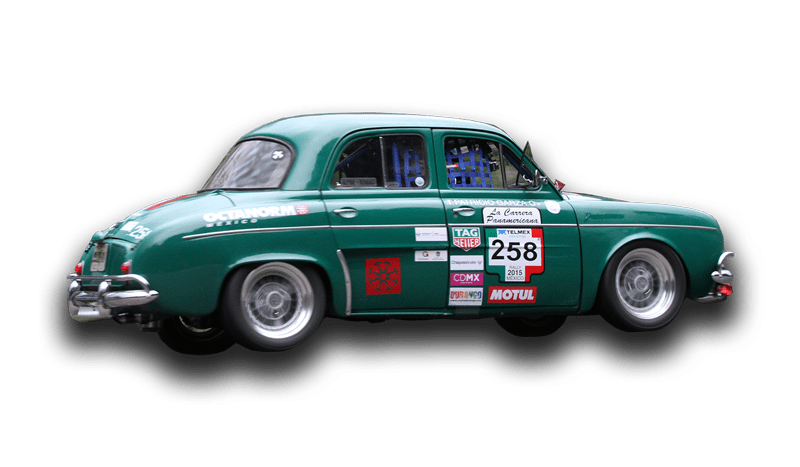
SPECIFICATIONS
Todos los autos de producción masiva y limitada de 1955 a 1975 y modelos más recientes estética y mecánicamente iguales a los de 1975 previamente autorizados por el Comité Organizador sin importar el país de origen. También se aceptan los autos incluidos en el apéndice “K” del código deportivo internacional de la FIA equipados con motores de 4 cilindros originales al igual que con carrocerías originales mientras cumplan con requisitos actuales en materia de seguridad. Para esta categoría, en caso de que se presenten tres o más autos de una cilindrada específica, el Comité Organizador abrirá una “Clase” propia al rango de cubicaje de los autos.
Engine: Non-original 4-cylinder engines are permitted, provided their capacity is no greater than 1,600cc (97.64″ cubic) and with a single overhead camshaft. Period engine modifications are permitted (if there is proof or evidence) provided they are approved by the Organizing Committee before being presented for scrutineering. A maximum oversize of 0.040″ is permitted. The use of carburettors is mandatory except for those cars originally equipped by the Manufacturer with a fuel injection system, which in this case must be the original make and model, and the competitor must present the corresponding FIA Homologation Form. The use of turbo chargers is prohibited except for cars that use this original system.
Numbers #280 to #299
HISTORIC CARS GROUP
TYPE OF CAR
Alfa Romeo Giulia, Datsun 510, Ford Cortina/ Escort, Volvo 122/Amazon, BMW 2002, Porsche 914-4, Opel GT, Glas, Dinalpin (this car is eligible as long as the following is met: maximum engine capacity: 1,600 cc (97.64″ cubic), 5-speed gearbox, weight not less than factory weight and the chassis must be reinforced and authorized by the Organizing Committee)
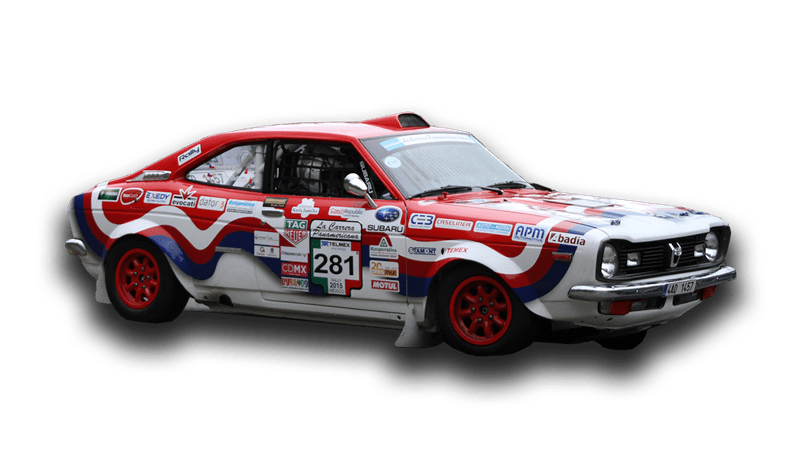
SPECIFICATIONS
Todos los autos de producción masiva y limitada de 1965 a 1975 y modelos más recientes estética y mecánicamente iguales a los de 1975 previamente autorizados por el Comité Organizador, sin importar el país de origen. También se aceptan los autos incluidos en el apéndice “K” del código deportivo internacional de la FIA equipados con motores de 4 cilindros originales al igual que con carrocerías originales y un límite de 2,000cc (122″ cúbicas) de cilindrada mientras cumplan con requisitos actuales en materia de seguridad. Para esta categoría, en caso de que se presenten tres o más autos de una cilindrada específica, el Comité Organizador abrirá una “Clase” propia al rango de cubicaje de los autos.
Engine: Modifications to the engine considered to be of the period (if there is proof or evidence) and approved by the Organising Committee before the scrutineering are permitted. A variation of 10% of the original engine displacement is permitted. The use of electronic camshaft variation devices is not permitted. The use of carburettors is mandatory except for those cars that were originally equipped with a fuel injection system. In this case, the participant must prove the authenticity of the use of this system by means of documents from the period (catalogues, magazines, homologation form, etc.). The use of turbochargers is prohibited except for cars that use this original system. In this case, a coefficient of 1.7 will be applied to calculate the displacement for class assignment within the category.
Numbers #300 to #349
HISTORIC CARS GROUP
TYPE OF CAR
Jaguar MK, XKE, Austin Healey 3000, Mercedes Benz 300SE, Ford Falcon 6, Ford Mustang 6, Chevrolet Corvair 6, Chevy II (Nova) 6, Plymouth Valiant 6, Dodge Dart 6, Barracuda 6, Studebaker Lark 6, Nash Rambler 6, Porsche 911, Datsun 240,260,280.
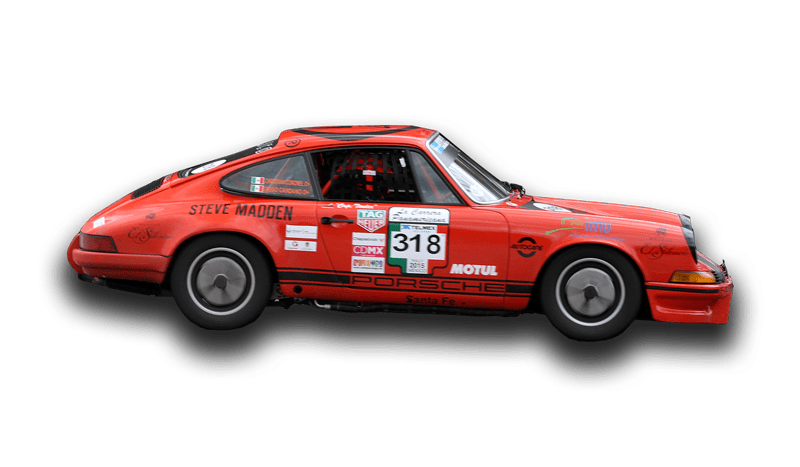
SPECIFICATIONS
All mass and limited production cars from 1955 to 1974 and more recent models aesthetically and mechanically identical to those of 1974 previously authorized by the Organizing Committee, regardless of the country of origin. Cars included in appendix “K” of the FIA International Sporting Code equipped with original 6-cylinder engines as well as original bodies are also accepted.
Engine: Modifications to the engine considered to be period-specific (if there is proof or evidence) and approved by the Organizing Committee before being presented for scrutiny are permitted. The maximum displacement for this category is 2.4 lt. for Porsche 911, 4.2 lt. for Jaguar, 3.0 lt. for Austin Healey, 2.8 lt. for Datsun and 4.1 lt. for cars of American origin such as Chevy II, Valiant, Falcon 6, etc. For cars not mentioned, a maximum oversize of 0.040″ is permitted. The use of carburettors is mandatory except for those cars that were originally equipped by the manufacturer with a fuel injection system. In this case, the participant must prove the authenticity of the use of this system by means of documents from the period (catalogues, magazines, homologation form, etc.). The use of turbochargers is prohibited except for cars that use this original system.
Numbers #550 to #599
HISTORIC CARS GROUP
TYPE OF CAR
Porsche 911, Maserati Mistral 3.7 L 1969-1970, Mercedes Benz 300SE y SEL 1963-1965, Lancia Flaminia V6 1965-1968, BMW 3.0 CS 1971-1974, Ferrari 246 Dino GT 1969-1971, Ford Capri y Ford Cologne Capri 1969-1973, Subaru XT6 y TVR V6-3.0L 1967-1971, AMC Gremlin, AMX y Javelin.
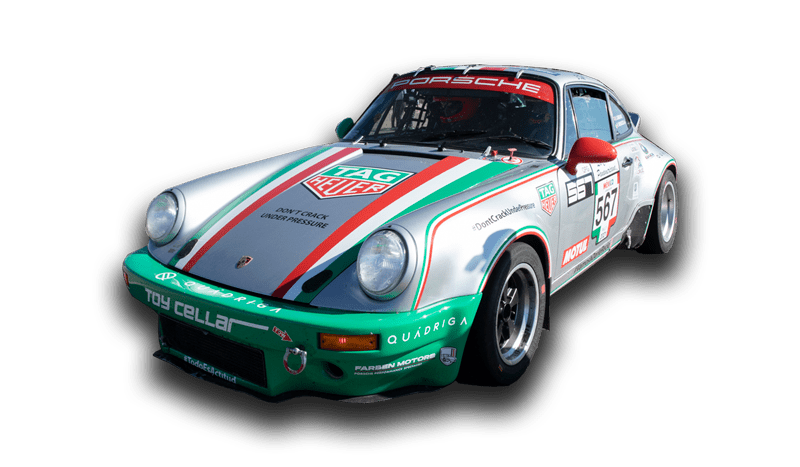
SPECIFICATIONS
Historic cars from 1964 to 1975 and identical to these, even if they are later models, as long as they maintain the same line and shape, equipped with a six-cylinder boxer engine up to 3,800 cc, or a six-cylinder V engine up to 3,500 cc or a six-cylinder in-line engine up to 4,200 cc. For this category, if three or more cars of a specific cylinder capacity are presented, the Organizing Committee will open a "Class" specific to the cubic capacity range of the cars.
Engine: For cars included in this category were originally equipped with any of the following engines, allowing to increase the stroke displacement as described below: Porsche; six-cylinder opposed (boxer type) engine same as those described below, which could have up to 3,800 cc (231.8 cubic inches) stroke displacement. Other makes and models: six-cylinder "v" engine, up to 3,500 cc (213.5 cubic inches) and six-cylinder inline engines up to 4,200 cc (256.2 cubic inches). Modifications to all these engines are totally free except that electronic or mechanical control devices to vary during operation the opening, closing and lifting times of the camshaft(s) are prohibited. The induction system must be carburettors, except for those cars that were originally equipped with a mechanically operated fuel injection system, which must be verified with the original documents, corresponding catalogues, and/or with the FIA or regional FIA homologation sheet if it has one. The use of injection systems with electronic control is explicitly prohibited. For cars equipped with carburettors, these are limited to the following: Weber, Solex or Mikuni carburettors must not exceed 50 mm in the diameter of the flow valve (butterfly) as well as 1.5 inches in diameter for "SU" carburettors. The use of superchargers and turbochargers or any supercharging system is prohibited except for cars that use this system from the factory.
Numbers #350 to #399
HISTORIC CARS GROUP
TYPE OF CAR
Chevrolet, Nova, Chevelle, Corvette V8 283, 327, Ford Falcon V8, Chevrolet Bel-Air V8, Chrysler 300 B/C/E, Ferrari 250/330/400/410, 275 GTB, Facel Vega FV/HK 500, Studebaker Hawk/Silver Hawk, BMW 507, Ford Mustang 260, 289, 302.
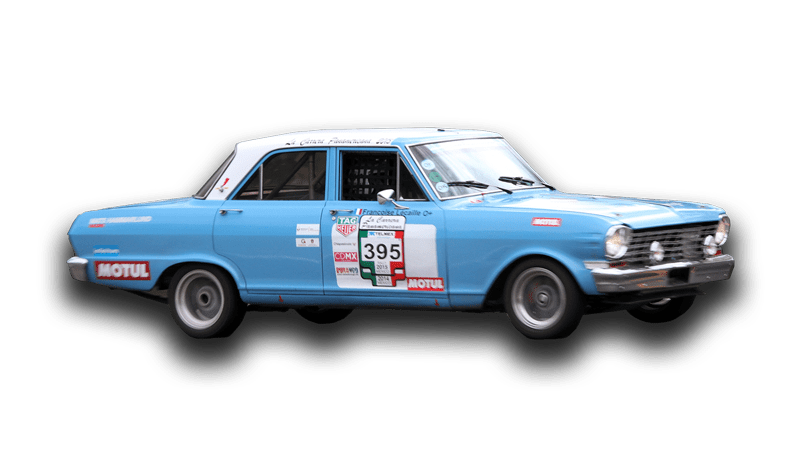
SPECIFICATIONS
Todos los autos de producción masiva y limitada de 1955 a 1975 y modelos más recientes estética y mecánicamente iguales a los de 1973 previamente autorizados por el Comité Organizador, sin importar el país de origen. También se aceptan los autos incluidos en el apéndice “K” del código deportivo internacional de la FIA equipados con motores de 8 y 12 cilindros originales al igual que con carrocerías originales mientras cumplan con requisitos actuales en materia de seguridad. Aquellos autos especiales, de producción única o limitada o de fabricación artesanal (hechos a mano), construidos en el periodo de 1950 a 1954, que mantengan sus características mecánicas y estéticas originales pueden ser aceptados en esta categoría, una vez comprobada su autenticidad (Artículo 15) y autorizados por el Comité Organizador antes del escrutinio. Para esta categoría, en caso de que se presenten tres o más autos de una cilindrada específica, el Comité Organizador abrirá una “Clase” propia al rango de cubicaje de los autos.
Engine: Connecting rods, pistons and rings are restriction-free. Pistons must not be more than 0.040″ in diameter over original. Valve train is restriction-free. The engine head must be cast iron, either original or a modern high-power one. The camshaft is restriction-free, as is the intake manifold. The use of a dry sump is prohibited. The use of a carburetor is mandatory and the maximum allowed intake is a 4-barrel carburetor and a flow not greater than 600 cubic feet per minute (c.f.m.). Cars weighing less than 2,800 lb (1273 kg) and equipped with an eight-cylinder engine must use a two-barrel carburetor with a maximum flow of 500 c.f.m. instead of the authorized four-barrel 600 c.f.m. carburetor. In the case of cars that had the direct fuel injection system as optional equipment (Chevrolet 1957), its use is permitted. In this case, the participant must prove the authenticity of the use of this system by means of documents from the period (catalogues, magazines, homologation form, etc.). The use of turbo chargers is prohibited except for cars that use this system from the factory.
Numbers from #651 to #700
HISTORIC CARS GROUP
TYPE OF CAR
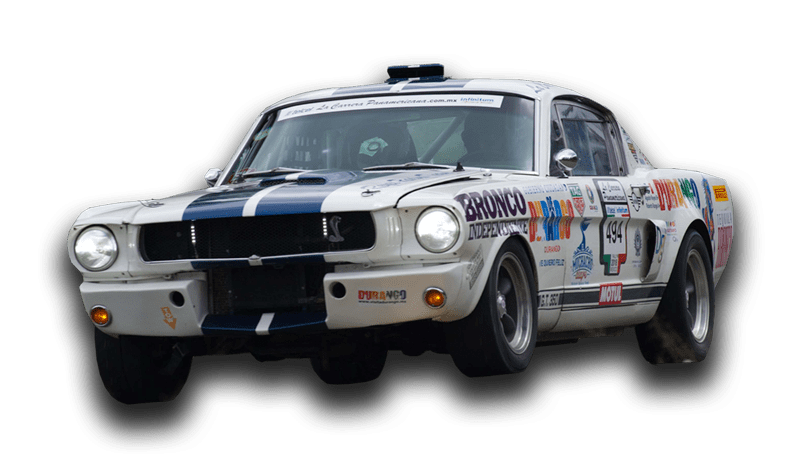
SPECIFICATIONS
All production cars (sedans) from 1955 to 1975 with original bodies and 8-cylinder V-shaped O.H.V. engines. All mass and limited production cars from 1955 to 1975 and more recent models, regardless of the country of origin. In order to register a car in this category, it is necessary that the Organizing Committee approves its registration. For this category, in case three or more cars of a specific displacement are presented, the Organizing Committee will open a “Class” specific to the cubic capacity range of the cars.
Engine: Puntos generales que aplican a todos los autos de esta categoría:
▪ El motor debe de conservar su diseño y cantidad de cilindros idénticos al modelo original.
▪ La cilindrada máxima de la categoría es de 5000 cc.
▪ Está prohibido el uso de turbo cargadores excepto para los autos que utilizan este sistema de origen.
▪ Es obligatorio el uso del motor panamericana spec con las siguientes características principales:
▪ Motor base Chevrolet 350.
▪ Desplazamiento máximo 360 pulgadas cúbicas.
▪ Relación de compresión máxima 11.0:1.
▪ Es obligatorio el uso de cabezas de fundición de hierro.
▪ Sólo se permite el uso de un carburador de 600 cc. de 4 gargantas.
▪ El motor puede ser desplazado hacia la parte posterior del habitáculo sin que se modifique la posición original de la pared de fuego.
Números #700 al #749
HISTORIC CARS GROUP
TYPE OF CAR
Austin Rover Metro 6R4, Lancia 037, Renault 5 Turbo, Alpine GTA, Lancia Delta S4, Ferrari GTO are some of the emblematic models of the legendary Group B that will now be able to participate in LCP.
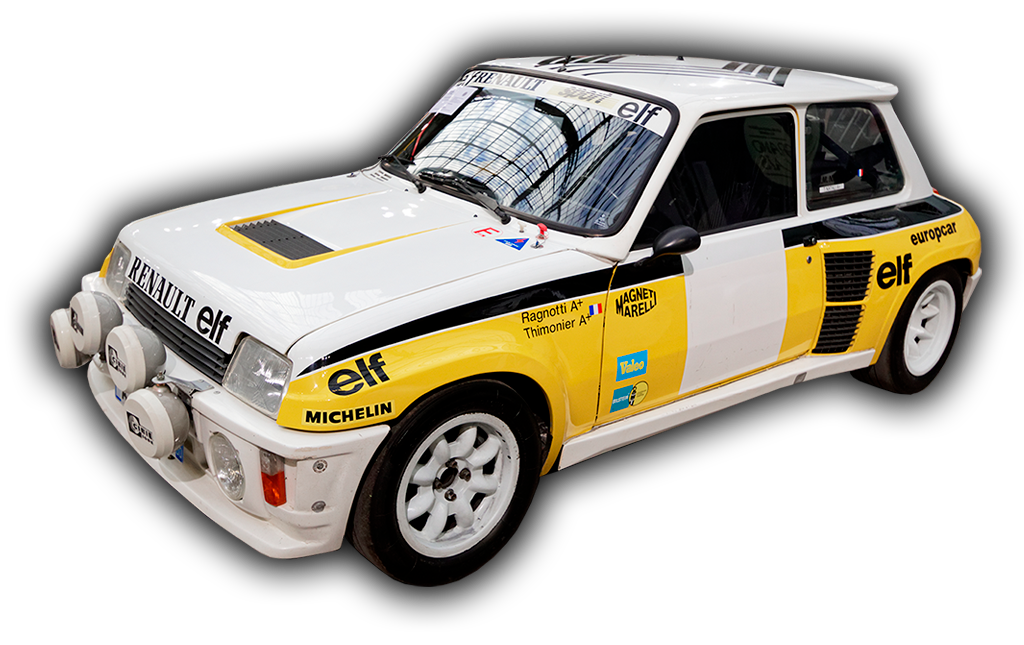
SPECIFICATIONS
All mass and limited production cars from 1976 to 1985 that have an FIA Historic Technical Passport (HTP – FIA Period H2, I & J1) regardless of the country of origin as long as they comply with current safety requirements. All cars in this category must comply with all points of their Historic Technical Passport without exception. Only one additional 1” wheel diameter is allowed on the homologation form in order to have more wheel options. The maximum speed allowed for cars in this category during timed stages depends on the period to which the car belongs. For cars from the “H2” (1976), “I” (1977-1981) period the maximum speed is 180km/h and for cars from the “J1” (1982-1985) period the maximum speed is 210km/h. Each vehicle will be equipped with a constant GPS monitoring device. For this category, if three or more cars of a specific engine capacity are entered, the Organizing Committee will open a “Class” specific to the engine capacity range of the cars. All cars in the category must be approved by the Committee prior to registration.
Numbers #750 to #799
HISTORIC CARS GROUP
TYPE OF CAR
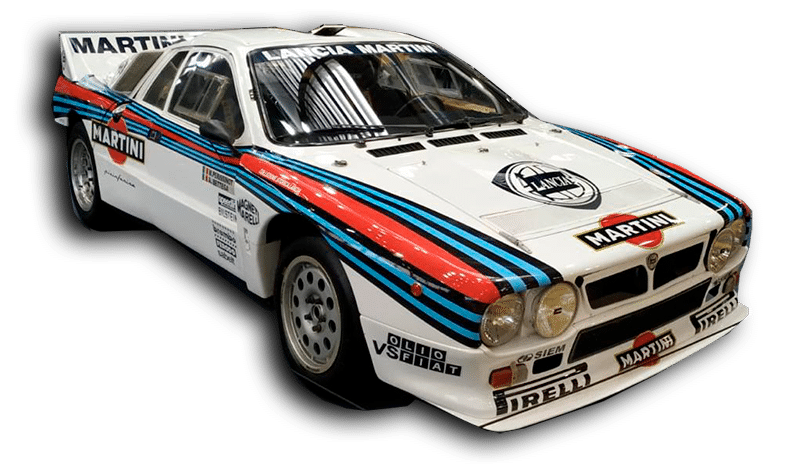
SPECIFICATIONS
Historic cars from 1976 to 1985 and similar, even if they are later models, as long as they maintain the same line. In order to register a car in this category, the Organizing Committee must approve its registration. For this category, if three or more cars of a specific cylinder capacity are presented, the Organizing Committee will open a “Class” specific to the cubic capacity range of the cars.
Engine: The architecture must be identical to the original, but a variation of 8% in displacement in relation to the original approved volume is authorized.
Numbers from #950 to #999
EXHIBITION CARS
TYPE OF CAR
BMW M2, Lotus Elise, Jaguar F Type, Maserati Sport GT.
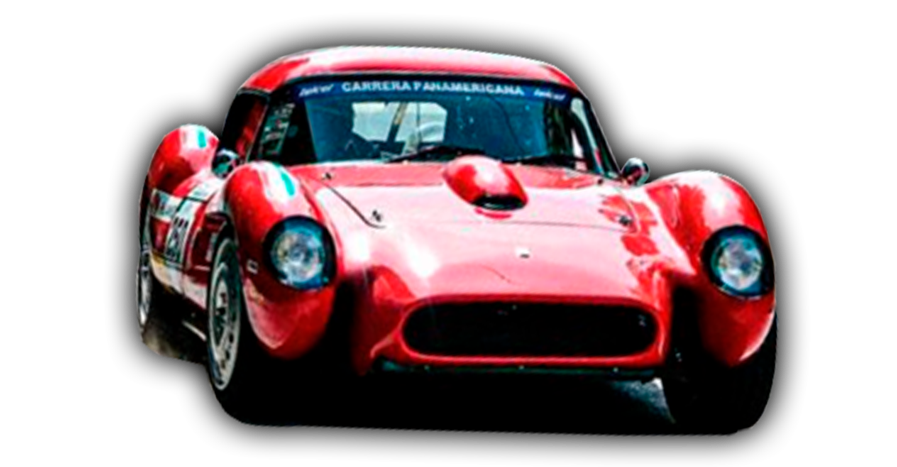
SPECIFICATIONS
Son todos los vehículos que no corresponden a ninguna de las 9 categorías de competencia antes indicadas (“Grupo de Autos Panamericanos” o del “Grupo de Autos Históricos”); pero que el Comité Organizador permite su participación sin puntuación y sin derecho a clasificación. Sin excepción, todos los autos y sus modificaciones están sujetos a aprobación por parte del Comité Organizador. El participante debe enviar el Carnet Digital Técnico y de Seguridad del auto al Secretariado Permanente para revisar su elegibilidad. Se debe reemplazar el tanque de gasolina original por un tanque de seguridad (fuel cell / fuel safe) no mayor de 83 lt. de capacidad. Se permite usar bombas eléctricas de gasolina.
